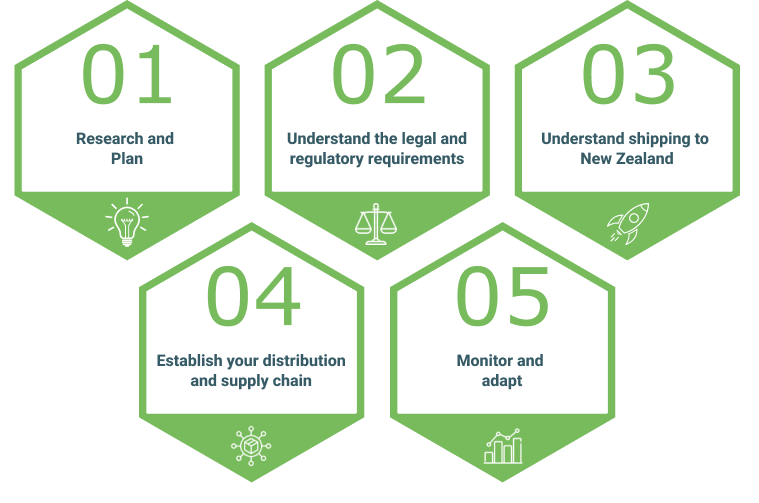
1. Research and plan
Begin by conducting thorough market research to understand the demand for your product in New Zealand. Identify your target audience and adapt your product offering to meet the local market, recognise cultural, language and even spelling differences. This could mean product modification, images, packaging or marketing. For example, the Vauxhall Nova car flopped in Spain. In Spanish, “no va” means “does not go”, not a good name for a car. Develop a pricing strategy that meets local demand and deals with factors, such as: currency fluctuations, regulatory and compliance variations. Undertake a detailed competitor analysis. Understanding your competition will enable you to successfully differentiate yourself.
Once you clearly understand your market you will be able to create a detailed business plan that outlines your objectives, marketing strategies, sales projections and financial forecasts. This plan will serve as a roadmap and will help you make informed decisions.

2. Understand the legal and regulatory requirements

While New Zealand has a relatively simple and transparent regulatory environment, there are still a number of steps you will need to follow. Familiarise yourself with these requirements before you start selling your product in New Zealand. Any business from NZ or overseas that wants to trade in New Zealand will likely need to register with the Companies Office. You will need to decide on a business structure. Choosing your structure is essential for tax purposes, income and how you conduct business. Ensure that your product complies with safety standards, labelling regulations and any specific industry regulations. Despite all this, setting up your business in New Zealand can be done in as little as three days. New Zealand has made it especially easy for businesses already incorporated in Australia to trade in New Zealand.
3. Understand shipping to New Zealand
New Zealand is a long way from anywhere and it can be expensive to get your product here. While these costs are unavoidable, you want to make sure that they, along with the extra charges and fees associated with importing goods, make sense for your business. Along with shipping, you will also need to understand the costs and logistics involved in importing goods to New Zealand. This includes customs clearance for your products in New Zealand. When importing your goods into New Zealand, they will need to be cleared by the New Zealand Customs Service and the Ministry for Primary Industries (MPI). There are also costs involved in clearing your goods into New Zealand. Depending on the value of your goods you may have to pay duty (a tax on your imported goods) and Goods and Services Tax (GST).

4. Establish your distribution and supply chain

Consider how you will store your products. Set up efficient distribution and supply chain systems to ensure your product reaches customers in a timely manner. Partner with reliable logistics providers and establish appropriate inventory management practices. Should you choose to work with a 3PL (Third Party Logistics company) they will be able to
- collect your goods and securely transport them to our warehouse
- check carefully for any possible damage
- store, pick, pack and despatch orders as they are received from your customers
- we can even handle customer returns, saving you time and money on international shipping
Working with a local 3PL will also allow you to benefit from competitive rates for NZ freight and receive advise about local market conditions and ways to promote your products.
5. Monitor and adapt
As with any market and economy, what is successful one year, may not be the next. Continuously monitor your sales, customer feedback and market trends and adapt your strategies accordingly. Stay informed about changes in regulations, consumer preferences and competition to remain competitive in the New Zealand market.

Sign up with Stocka
Start selling in New Zealand with Stocka
We understand it can be hard to manage things when you are not physically in the country. At Stocka we are happy to help you establish or build your sales channels successfully and stay connected with your customers. Whether it’s help importing stock, understanding the retail landscape, or advice on local tradeshows, we are here to support you.
Want to find out more about how Stocka can help your business?
Fill out the form below to book a 15 minute 3PL chat.
Ready to get started with Stocka 3PL? Book your 15 minute 3PL chat and learn just how easy it is.
It’s free and there’s no obligation.

